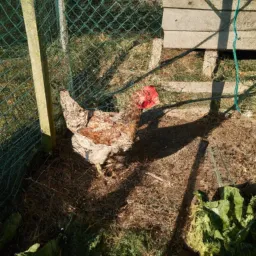How Many Chickens Should You Keep in the Suburbs: A Guide to Egg Laying and Regulations
Keeping chickens can be a rewarding experience, but it’s important to consider how many you should keep.
Too few and your egg production may not meet your needs; too many and you could face regulation issues or overwhelm yourself with caretaking responsibilities.
Here are some things to consider when deciding on how many chickens to keep in the suburbs.
If you’re considering keeping chickens, one of the first questions you might ask is “how many?”
While there isn’t necessarily a right answer, here are some factors to consider that will help you determine the best number for your situation.
Egg Laying Capacity of Chickens
Chicken eggs typically range from 50 grams to 63 grams each, depending on the breed. On average, a laying hen will produce an egg every day or two, so if you want a steady supply of fresh eggs, you’ll need at least three hens.
However, more hens mean more eggs, which can be useful if you have a large family or like to sell excess eggs. Some breeds of chickens are known for their high egg production rates, such as Leghorns and Wyandottes.
Regulations on Keeping Chickens in the Suburbs
Before you start building coops and buying feed, check your local ordinances regarding keeping chickens in residential areas.
Many cities and towns have specific rules about the number of birds allowed per property, where they can be kept, and what types of enclosures are required. Failure to follow these regulations can result in fines or even having your chickens confiscated.
See also The Majestic Sebright Chicken
It’s always better to play by the rules than risk getting into trouble down the line.
Benefits and Drawbacks to Keeping Chickens in the Suburbs
There are several benefits to keeping chickens in the suburbs, including access to fresh eggs, reduced waste through composting, and the opportunity to teach children about animal husbandry.

However, there are also drawbacks to consider, such as noise pollution (chickens make quite a racket!), potential smells from manure, and the time commitment involved in caring for them.
Before making the decision to keep chickens, weigh the pros and cons carefully to ensure that this is the right choice for you.
Ultimately, the decision of how many chickens to keep depends on your individual circumstances and preferences.
Consider factors such as egg demand, space availability, regulatory requirements, and personal motivations before deciding.
With careful planning and attention to detail, keeping chickens in the suburbs can be a rewarding and sustainable lifestyle choice.
